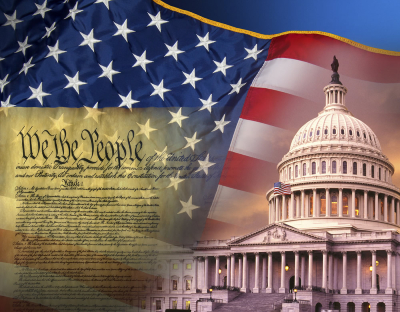We ask you, urgently: don't scroll past this
Dear readers, Catholic Online was de-platformed by Shopify for our pro-life beliefs. They shut down our Catholic Online, Catholic Online School, Prayer Candles, and Catholic Online Learning Resources essential faith tools serving over 1.4 million students and millions of families worldwide. Our founders, now in their 70's, just gave their entire life savings to protect this mission. But fewer than 2% of readers donate. If everyone gave just $5, the cost of a coffee, we could rebuild stronger and keep Catholic education free for all. Stand with us in faith. Thank you.Help Now >
Political chaos in America has produced one weird benefit for all...
FREE Catholic Classes
If you ask Americans to name the three branches of their government, you may be surprised to find some cannot do it. It's a simple question with a simple answer, but apparently many are unaware of how the United States government works. The good news is, that is changing.

Highlights
LOS ANGELES, CA (California Network) - The Annenberg Public Policy Center performed its annual poll of more than 1,000 people to ask if they could name all three branches of government. A shocking 44 percent were unable to do so. Even more remarkable is this statistic is an improvement from previous years. In 2006, when the survey was first conducted, only a third (33 percent) of respondents could correctly name all three branches.
The reason for the improvement is political chaos. Over the pat several years, political discussion has become much more commonplace and Americans are more educated than ever about government and the political process.
Of course, 56 percent is still a dismal statistic overall, but progress is progress.
Historically, Americans tend to be apathetic when it comes to government. This is likely by design. Schools teach government in the 8th and 12th grades, but the instruction is limited. For high school seniors, it is one of the last classes they complete before graduation, and then it is only taught for half-a-year. Most teenagers feel they have more important concerns than to learn about the intricacies of government.
The product of this failure is an uninformed electorate. Tens of millions of Americans cannot list the three branches of government, what they do, or even explain what the Bill of Rights is. While most understand the basics of the First, Second, and Fifth Amendments to the Constitution, they do not know much more. For example, they know the First Amendment protects freedom of expression, but they may not know it also protects freedom of religion, the press, the right to assembly, or to petition. They may know Americans have a right to possess firearms, but they do not know the Amendment also mentions a "well-regulated militia." And for many, they know the Fifth Amendment allows them to remain silent if questioned as part of a criminal matter.
Not only do most Americans fail to understand their rights, they do not comprehend how government is supposed to work. Nor can they explain the relationship between government and economics. Most have no idea what the Federal Reserve is.
The implications of this are staggering. Imagine a person who does not know all of the Ten Commandments. Sadly, this is also a major issue. A person who does not know the Commandments could be placing themselves and others into a dangerous, even scandalous situation without realizing it. It is likewise with politics. Americans consistently fail to vote, or cast uninformed ballots, often voting against their own self-interest because they cannot see past the emotional rhetoric of political advertising.
Should the political situation in America improve, what happens then? Will Americans return to apathy and unlearn the lessons of the previous 15 years? It's likely.
The only way to combat this problem is with education. Catholic Online School recently launched a course on the Constitution of the United States, and it comes with a certificate of completion. After completing the course, every student should know the three branches of government, and then some. The course is well-presented, and features bite-sized lessons that should be easy to understand.
You can take the course for free by clicking here. And, for those who may be wondering, here is another freebie: The three branches of the government are the executive, legislative, and judicial branches. You can learn what these branches do in the course.
Join the Movement
When you sign up below, you don't just join an email list - you're joining an entire movement for Free world class Catholic education.
A Lenten Message from Sister Catherine - Please Watch
- Easter / Lent
- 5 Lenten Prayers
- Ash Wednesday
- 7 Morning Prayers
- Mysteries of the Rosary
- Litany of the Bl. Virgin Mary
- Popular Saints
- Popular Prayers
- Female Saints
- Saint Feast Days by Month
- Stations of the Cross
- St. Francis of Assisi
- St. Michael the Archangel
- The Apostles' Creed
- Unfailing Prayer to St. Anthony
- Pray the Rosary
![]()
Copyright 2026 Catholic Online. All materials contained on this site, whether written, audible or visual are the exclusive property of Catholic Online and are protected under U.S. and International copyright laws, © Copyright 2026 Catholic Online. Any unauthorized use, without prior written consent of Catholic Online is strictly forbidden and prohibited.
Catholic Online is a Project of Your Catholic Voice Foundation, a Not-for-Profit Corporation. Your Catholic Voice Foundation has been granted a recognition of tax exemption under Section 501(c)(3) of the Internal Revenue Code. Federal Tax Identification Number: 81-0596847. Your gift is tax-deductible as allowed by law.







